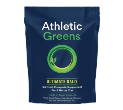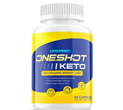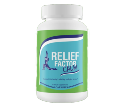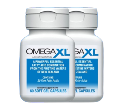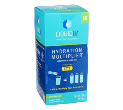Focus Factor Reviews, Ingredients, Does It Work?
Edited and medically reviewed by ✔️ Team of BestInSupplements | Written by Katelyn Johnson (B.S. and M.S. in Nutrition Science)
Focus Factor is undoubtedly a quality nootropic supplement. But, does it work and should you try it? Read our review to discover its ingredients, safety, benefits, and uses before you do.
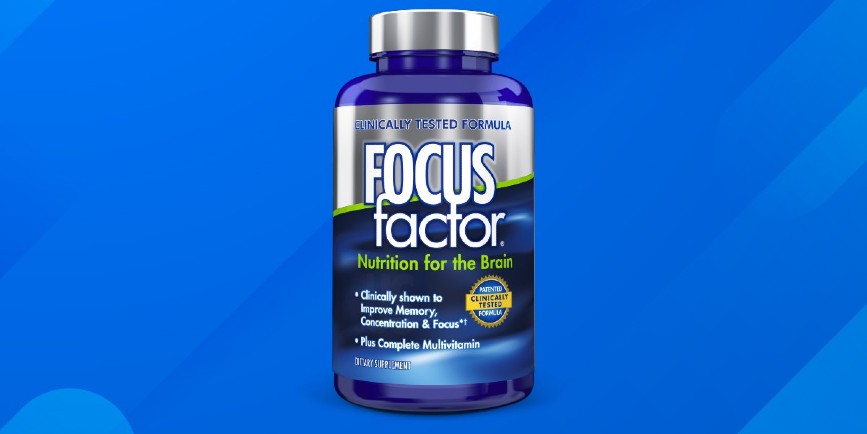
Many people believe that taking a cognitive health supplement such as Focus Factor that can improve cognitive ability, memory, and focus can help them cope with stressful situations 1.
Brain health supplements have been on the market for some time and never fail to be a topic of interest in the scientific community as there are few with proven efficacy. That’s where Focus Factor is different and continues to be one of the top nootropic competitors.
This review is a part of: The Best Brain Supplements You Can Buy
Focus Factor is manufactured by Factor Nutrition Labs and is one of the few nootropic supplements that has been tested, in its entirety, through clinical science 2. This brain health supplement contains an ingredient profile - neuro-nutrients, vitamins, minerals - that promotes overall brain health, aiding in memory, concentration, and focus 1.
With a total of 40 active compounds, including a unique mix of vitamins, minerals, herbal extracts, and Omega-3 fatty acids, Focus Factor chose each of their ingredients carefully based on their specific qualities to promote healthy cognitive function 2.
Here You Will Discover More About:
Focus Factor Benefits
The Focus Factor nutritional supplement is shown to improve mental cognition, focus, and memory.
According to a recent study, after using Focus Factor for six weeks, the study subjects reported improvements in their memory, concentration, and attention. Overall, subjects taking Focus Factor scored 44% higher on a memory recall test than people in the placebo group. The study concluded that Focus Factor provided benefits similar to a 20-year decrease in cognitive aging 2.
Focus Factor Ingredients
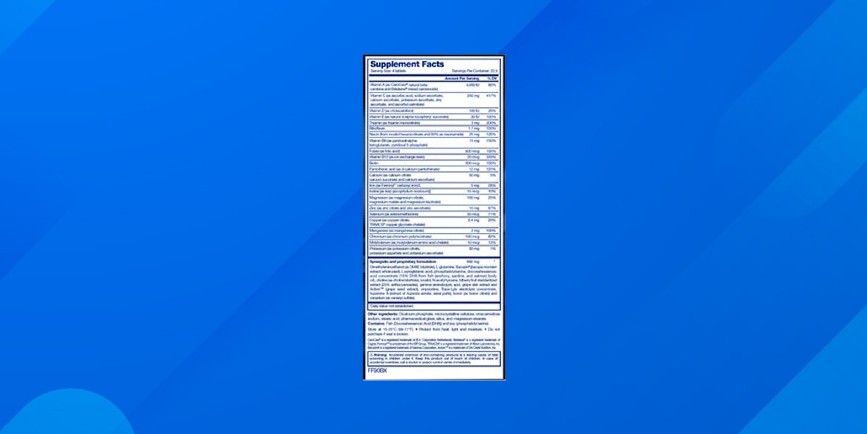
The proprietary blend in Focus Factor contains a wide variety of ingredients, each having a different effect on your cognition and mental health.
Focus Factors formula contains a number of potent ingredients that have been shown to improve overall cognitive health. Factor Nutrition states this supplement will improve memory, focus, and attention while also providing optimal nutrition for your brain. Focus Factor formula contains the following ingredients:
- Vitamin D 2.5 mcg.
- Potassium 50 mg,
- Vitamin A 1,200 mcg,
- Vitamin E 20 mg.
- Vitamin B6 15 mg
- Vitamin C 250 mg.
- Chromium 100 mcg.
- Folate (400 mcg folic acid) 665 mcg.
- Molybdenum 10 mcg.
- Vitamin B12 20 mcg.
- Riboflavin 1.7 mg.
- Selenium 50 mcg.
- Thiamin 3 mg.
- Calcium 50 mg.
- Niacin (inositol and 50% niacinamide) 25 mg.
- Copper 0.4 mg.
- Magnesium 100 mg.
- Iron 5 mg.
- Biotin 300 mcg.
- Pantothenic acid 12 mg.
- Choline 30 mg.
- Zinc 10 mg.
- Manganese 2 mg.
- Iodine 15 mcg.
- Proprietary Blend (L-glutamine, Vanadium, Phosphatidylserine, Bilberry fruit standardized extract, Dimethylaminoethanol, Choline, Grape seed extract, L-pyroglutamic acid, N-acetyl Tyrosine, Huperzine-A, Vinpocetine, Inositol, Bacopin, Trace-Lyte electrolyte concentrate, Gamma-aminobutyric acid, Boron, Docosahexaenoic acid concentrate, and Grape skin extract).
Bacopin (Bacopa Monnieri Extract)
Bacopa monnieri is a plant extract with powerful nootropic properties that has been used in traditional Chinese medicine for centuries. Scientists demonstrate Bacopa monnieri has potential as a treatment for Alzheimer's disease. According to studies, it improved cognitive function, orientation, attention, and language ability. This plant may also help to reduce brain inflammation 3.
Dimethylaminoethanol (DMAE Bitartrate)
DMAE is required for choline production in the body. Choline takes part in the brain's central framework to form the neurotransmitter acetylcholine, which is essential for learning and memory. Although research is progressing, DMAE has the ability to help improve memory deficits in dementia patients, as well as a treatment method for ADHD 4.
L-pyroglutamic Acid
This is a glutamic acid and glutamine-derived amino acid. A rat study found that supplementing with pyroglutamic acid improved their learning and memory. Individuals with age-related memory decline saw improvements in verbal memory function after taking pyroglutamic acid for 60 days, according to a randomized trial 5.
Phosphatidylserine
Phosphatidylserine is a phospholipid, which is a type of fat known to be essential in preserving the integrity of nerve cell membranes. It also contributes to the formation of the myelin sheath, which protects nerve cells and allows for the rapid transmission of brain signals for memory and cognitive function. Phosphatidylserine supplementation can help to slow down cognitive aging by preventing or reversing nerve cell alterations and deterioration 6.
Docosahexaenoic Acid (DHA)
DHA is an omega-3 fatty acid and also the brain's primary fatty acid. It is necessary for proper brain development in children, as well as normal cognitive function and the prevention of cognitive decline. Children with ADHD, adults with behavioral issues, and others with inflammatory brain conditions may benefit from DHA 7,8.
Inositol
Inositol is a type of sugar that your body can synthesize from dietary carbohydrates. It has the ability to affect hormone and neurotransmitter signaling pathways in the brain, including dopamine, norepinephrine, and serotonin. Inositol supplementation may be beneficial for SSRI(serotonin selective reuptake inhibitors)-responsive conditions, such as OCD and depression 9.
N-acetyl Tyrosine
Tyrosine is an amino acid that serves as a precursor to neurotransmitters such as epinephrine and dopamine. Tyrosine supplementation can help young adults improve cognitive performance in high-stress environments, according to research. Tyrosine can slow cognitive aging in older people by improving dopamine transport in the brain 10.
Bilberry Fruit Extract
Bilberry extract is an antioxidant-rich source of the anthocyanins, which are compounds that have the ability to reduce inflammation. Bilberry has been shown in animal studies to be neuroprotective, improve neuron communication, and increase dopamine release in the brain. Other research suggests it can protect against neuroinflammation and neuron damage in animals, which improves short-term memory 11.
Gamma-Aminobutyric Acid
Gamma-aminobutyric acid (GABA) is the central nervous system's primary neurotransmitter responsible for lowering stress and anxiety. Research indicates in stressful situations/environments, GABA supplementation can enhance focus and minimize psychological exhaustion 12.
Take a look at this alternative: Mind Lab Pro Reviews, Ingredients, Does It Work?
Grape Skin and Seed Extract
Grapes are a rich dietary source of resveratrol, which is a powerful antioxidant that can inhibit the formation of amyloid-beta plaques, which are indicative of Alzheimer's disease. Antioxidants derived from grapes were found to protect the brain from ischemic stroke and oxidative stress in an animal study 13.
Vinpocetine
Another nootropic compound that helps with working memory and memory recall is vinpocetine. Its use in clinical settings proved beneficial in treatments of stroke, senile dementia, and memory impairments. According to research, vinpocetine reduced inflammation after cerebral injury and improved neurological function recovery after stroke 14.
L-glutamine
Glutamine is a precursor amino acid required by glutamate and GABA, both of which are the brain's primary excitatory and inhibitory neurotransmitters 15. Glutamate is required for brain plasticity and the development of long-term potentiation, which aids memory and learning by strengthening synaptic connections between neurons over time. In one study, when compared to individuals with dementia, those with Alzheimer's disease had lower brain serum levels of glutamine and glutamate 16,17.
Huperzine A (Extract of Hupezia Serrata)
Huperzine A is a herb extract often used in the treatment of Alzheimer’s disease. An analysis of individuals affected by Alzheimer’s disease found that Huperzine A supplementation improved daily living activities and cognitive function 18.
Boron
Boron is a mineral that can be found in a variety of foods. Boron deficiency is linked to cognitive impairments, including short-term memory, attention, and task performance requiring motor speed and dexterity. Supplementation is likely to aid in the improvement of brain electrical activity and thus cognitive function 19.
Ginkgo Biloba Extract (Leaf)
Ginkgo biloba has long been used for its brain-health benefits. Ginkgo biloba may act as an antioxidant, an anticoagulant, or aid neurotransmitter function. It has also been shown in research studies to help people with brain injury, Alzheimer's disease, and aging improve their information processing, memory, and daily activities 20.
Focus Factor Safety and Side Effects
According to Factor Nutrition Labs, Focus Factor is free of any potentially harmful or prohibited ingredients 2. When taken as directed, Focus Factor Original is generally viewed as safe to consume.
That said, a few users have claimed to have experienced minor side effects, including headaches, irritability, stomach upset, drowsiness, excitation, insomnia, nausea, and dizziness.
Pregnant women and women of childbearing age should avoid taking this supplement.
If you're interested in trying Focus Factor, it's best to talk to your doctor first to make sure it's right for you.
Who Should Buy Focus Factor?
Focus Factor Original is designed for people who want to enhance their cognitive processes, memory, alertness, concentration, and multitasking abilities.
Focus Factor Reviews and Final Thoughts
For people wanting a natural, high-quality brain health supplement, Focus Factor promises to improve memory, focus, and attention.
In the United States, Focus Factor is one of the most popular brain supplements. It's made by a reputed and reliable company, receiving thousands of highly positive reviews and testimonials over the last decade. The majority of Focus Factor customer ratings and feedback are very good and promising, many stating they are pleased with the results and would recommend the supplement to a friend.
Take a look at this list: The Best Dopamine Supplements You Can Buy
Based on the numerous positive reviews and testimonials, it appears that Focus Factor is a promising nootropic product that lives up to its claims.
Where to Buy Focus Factor
Focus Factor can be purchased from their official website, Amazon, and a variety of retailers such as Costco, Walgreens, Walmart, CVS, and many others.
On their website, Focus Factor offers a variety of purchase options, including bottle sizes and bundling options.
Bottles containing 60, 90, 150, or 180 tablets can be purchased.
Single bottles range in price from around $15 to roughly $25, with tablet prices dropping from around $0.25 to approximately $0.15 per tablet if you purchase a larger bottle.

References
- Heidrich, H. (Ed.). (2012). Proof of Therapeutical Effectiveness of Nootropic and Vasoactive Drugs: Advances in Clinical and Experimental Nicergoline Research. Springer Science & Business Media.
- Factor Nutrition Labs official website. Retrieved on November 24, 2020.
- Uabundit, N., Wattanathorn, J., Mucimapura, S., & Ingkaninan, K. (2010). Cognitive enhancement and neuroprotective effects of Bacopa monnieri in Alzheimer's disease model. Journal of ethnopharmacology, 127(1), 26-31.
- Liu, S., Chen, Z., Cai, X., Sun, Y., Zhao, C., Liu, F., & Liu, D. (2014). Effects of dimethylaminoethanol and compound amino acid on D-galactose induced skin aging model of rat. The Scientific World Journal, 2014.
- Schilling, S., Zeitschel, U., Hoffmann, T., Heiser, U., Francke, M., Kehlen, A., ... & Rossner, S. (2008). Glutaminyl cyclase inhibition attenuates pyroglutamate Aβ and Alzheimer's disease–like pathology. Nature medicine, 14(10), 1106-1111.
- Moré, M. I., Freitas, U., & Rutenberg, D. (2014). Positive effects of soy lecithin-derived phosphatidylserine plus phosphatidic acid on memory, cognition, daily functioning, and mood in elderly patients with Alzheimer’s disease and dementia. Advances in therapy, 31(12), 1247-1262.
- Swanson, D., Block, R., & Mousa, S. A. (2012). Omega-3 fatty acids EPA and DHA: health benefits throughout life. Advances in nutrition, 3(1), 1-7.
- Horrocks, L. A., & Yeo, Y. K. (1999). Health benefits of docosahexaenoic acid (DHA). Pharmacological research, 40(3), 211–225. https://doi.org/10.1006/phrs.1999.0495
- Fernández, S. S. M., Ivanauskas, T., & Ribeiro, S. M. L. (2017). Nutritional strategies in the management of Alzheimer disease: systematic review with network meta-analysis. Journal of the American Medical Directors Association, 18(10), 897-e13.
- Pinton, S., Brüning, C. A., Oliveira, C. E. S., Prigol, M., & Nogueira, C. W. (2013). Therapeutic effect of organoselenium dietary supplementation in a sporadic dementia of Alzheimer's type model in rats. The Journal of nutritional biochemistry, 24(1), 311-317.
- Milenkovic, D., Krga, I., Dinel, A. L., Morand, C., Laye, S., & Castanon, N. (2021). Nutrigenomic modification induced by anthocyanin-rich bilberry extract in the hippocampus of ApoE-/-mice. Journal of Functional Foods, 85, 104609.
- Akbari, E., Asemi, Z., Daneshvar Kakhaki, R., Bahmani, F., Kouchaki, E., Tamtaji, O. R., ... & Salami, M. (2016). Effect of probiotic supplementation on cognitive function and metabolic status in Alzheimer's disease: a randomized, double-blind and controlled trial. Frontiers in aging neuroscience, 8, 256.
- Komorowska, J., Wątroba, M., & Szukiewicz, D. (2020). Review of beneficial effects of resveratrol in neurodegenerative diseases such as Alzheimer's disease. Advances in Medical Sciences, 65(2), 415-423.
- French, J. M., King, M. D., & McDougal, O. M. (2016). Quantitative determination of vinpocetine in dietary supplements. Natural product communications, 11(5), 1934578X1601100512.
- Tinsley, G. (2018). Glutamine: Benefits, Uses and Side Effects.
- Wilmore DW. The effect of glutamine supplementation in patients following elective surgery and accidental injury. J Nutr. 2001 Sep;131(9 Suppl):2543S-9S; discussion 2550S-1S. doi: 10.1093/jn/131.9.2543S. PMID: 11533310.
- Wischmeyer, P. E. (2003). Clinical applications of L‐glutamine: past, present, and future. Nutrition in clinical Practice, 18(5), 377-385.
- Shi, Q., Fu, J., Ge, D., He, Y., Ran, J., Liu, Z., ... & Lu, Y. (2012). Huperzine A ameliorates cognitive deficits and oxidative stress in the hippocampus of rats exposed to acute hypobaric hypoxia. Neurochemical research, 37(9), 2042-2052.
- Maiti, P., Manna, J., Burch, Z. N., Flaherty, D. B., Larkin, J. D., & Dunbar, G. L. (2020). Ameliorative Properties of Boronic Compounds in In Vitro and In Vivo Models of Alzheimer’s Disease. International Journal of Molecular Sciences, 21(18), 6664.
- Belviranlı, M., & Okudan, N. (2015). The effects of Ginkgo biloba extract on cognitive functions in aged female rats: the role of oxidative stress and brain-derived neurotrophic factor. Behavioural brain research, 278, 453-461.
Every editorial product is independently selected, though we may be compensated or receive an affiliate commission if you buy something through our links.
Recently Purchased


